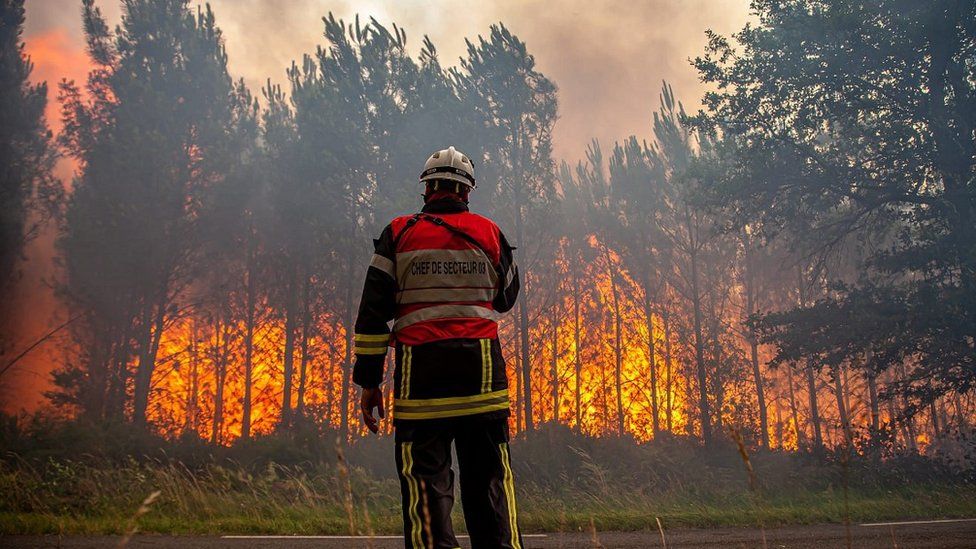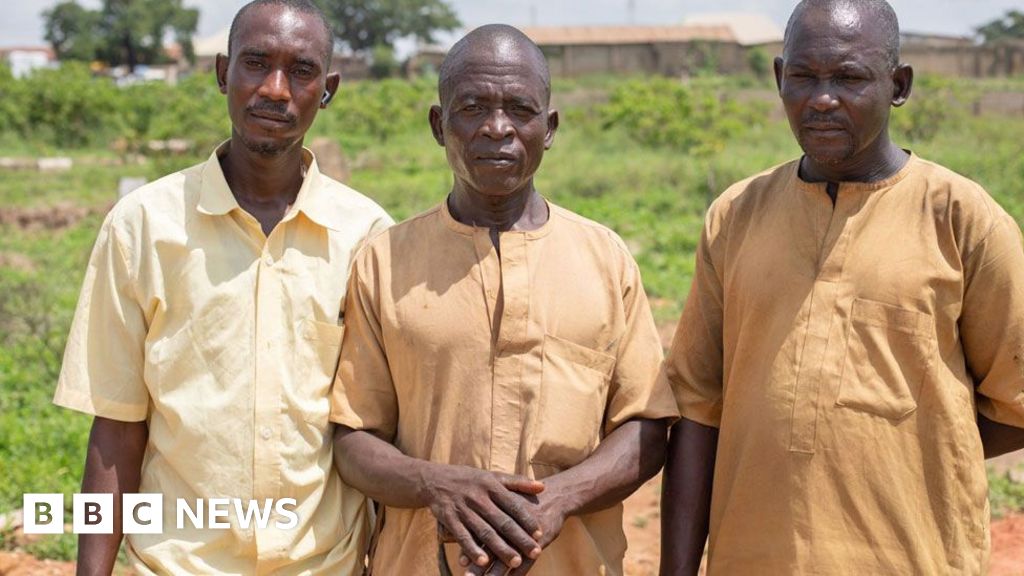ARTICLE AD BOX
By Laurence Peter
BBC News
 Image source, EPA
Image source, EPA
The fire in Landiras, south-west France, is still spreading
France has evacuated more than 14,000 people threatened by wildfires in the south-west, as fires also spread in Spain, Croatia and Greece.
Authorities in France's Gironde, a popular tourist region, have evacuated guards from campsites - the tourists left earlier. Fires have spread in the Teste-de-Buch and Landiras areas.
In southern Spain, more than 3,200 people fled fires in the Mijas hills, though later some were able to return.
Portugal's fires are contained for now.
However, the Portuguese authorities say at least 238 people have died from the heat over the past week.
The Mijas fires in Spain are not far from Málaga, a popular tourist area. Elsewhere in Spain, wildfires have broken out in the provinces of Castilla y León and Galicia.
Ellen McCurdy, living in the Málaga area, told Reuters news agency: "We just grabbed a few essentials and just ran really, and by that stage everybody along the street was on the move... there were a lot ambulances and fire engines."
Image source, Getty Images
Image caption,A forest fire near Lugo in Galicia, north-west Spain
Across the Mediterranean - from Morocco in the west to Crete in the east - thousands of firefighters and many waterbombing aircraft have been deployed. Since Tuesday, the whole region has been sweltering in severe heat, leaving vegetation bone dry.
Heatwaves have become more frequent, more intense, and last longer because of human-induced climate change. The world has already warmed by about 1.1C since the industrial era began and temperatures will keep rising unless governments around the world make steep cuts to carbon emissions.
The French weather service has forecast temperatures of up to 41C in the country's south on Sunday and new heat records are predicted for Monday. In Portugal, the temperature recently reached 47C.
Morocco has ordered more than 1,300 people to leave their homes and deployed more firefighters to tackle forest blazes in the north. The worst-hit area is Larache province.
In Crete, Greek firefighters are battling blazes in the hills around Rethymno, on the north coast.
Some areas in south-west Turkey and on Croatia's Adriatic coast are also struggling with wildfires. A number broke out near Croatia's resort towns of Zadar and Sibenik, but they have not forced any major evacuations.
Late on Saturday, France placed 22 more regional departments - mostly along its Atlantic coast - on high orange alert.
One resident in south-west France described the forest fires as feeling "post-apocalyptic". Fires have burned 10,500 hectares (26,000 acres) of land there and Interior Minister Gerald Darmanin praised firefighters' "remarkable courage".
Manon Jacquart was evacuated on Wednesday and has been sleeping in a shelter
"Everything went so fast - the fire too, was big, big, big," Manon Jacquart, 27, told the BBC. She was evacuated from the campsite she works at early on Wednesday morning, and has been sleeping at a shelter near Teste-de-Buch.
"I'm just worried, I'm afraid… I'm trying to be as strong as I can but I'm not ok… I want to forget this week," she said.
Manon is one of hundreds of people from the danger zone at the temporary shelter. Animal rescues are being organised from there, but it is a slow process, the BBC's Jessica Parker reports.
Meanwhile, climbers in the Alps are being urged to postpone their trips to Mont Blanc due to the risk of rock falls caused by "exceptional climatic conditions".
Why is it so hot (in under 60 seconds)?
In Portugal, fires have destroyed 30,000 hectares (75,000 acres) of land this year, mainly in the north. That is the worst fire damage since the summer of 2017, when devastating fires killed some 100 people.
In southern Spain, holidaymakers on the beach in Torremolinos saw big plumes of smoke rising in the hills.
Planes have been a dropping fire retardant substance, as helicopters shuttle to and from the coast, collecting seawater to douse the flames.
Image source, Ashley Baker
Image caption,Southern Spain: Fires in the Mijas hills are not far from holiday homes
"There are about 40 houses in our area, everyone was really nervous and standing outside or on balconies watching it," said local resident Ashley Baker.
"Even now there are fires at the top of the mountains. It moved away from here, I'm very relieved."
In Italy, the government has declared a state of emergency in the desiccated Po Valley - the country's longest river is no more than a trickle in some places.
Are you in an area that has been affected by the wildfires? You can get in touch by emailing haveyoursay@bbc.co.uk.
Please include a contact number if you are willing to speak to a BBC journalist. You can also get in touch in the following ways:
If you are reading this page and can't see the form you will need to visit the mobile version of the BBC website to submit your question or comment or you can email us at HaveYourSay@bbc.co.uk. Please include your name, age and location with any submission.

 2 years ago
17
2 years ago
17








 English (US) ·
English (US) ·